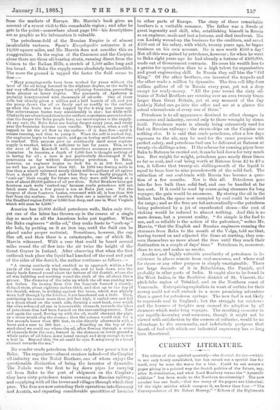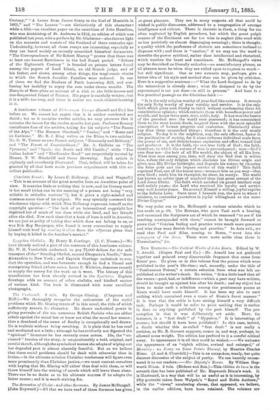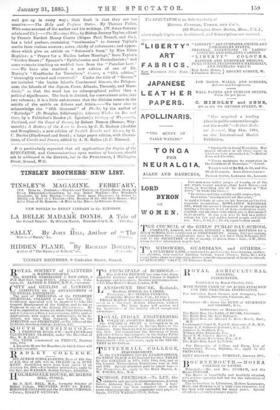CURRENT LITERATURE.
'Die editor of that spirited quarterly—the Scottieh Review—which is not only firmly established, bat has struck out a special line for itself, may be none the worse for a hint. Could he not -secure a paper giving in a pointed way the Scotch politics of the future, say, after Redistribution, and what Lord Rosebery terms the "Apostolic addition" has been made to the Northern membership ? The new number has one fault,—that too many of its papers are historical. Of the eight articles which compose it, no fewer than four--" The Correspoudence of Sir Robert Murray," "Echoes of the Eighteenth
Century," "A Letter from James Sharp to the Earl of Monteith in 1661," and "The Lennox "—are distinctively of this character; while a fifth—an excellent paper on the catechism of John Hamilton, who was Archbishop of St. Andrews in 1552, an edition of which was published last year, with a preface by Mr. Gladstone—also throws light on the manners and morals of the Scotland of three centuries ago. Undoubtedly, however, all these essays are interesting, especially as they are based mainly on recently unearthed historical documents. "The Correspondence of Sir Robert Murray" proves that there was at least one honest Scotchman in the bad Stuart period. "Echoes of the Eighteenth Century" is founded on private letters found among the papers of Lord Eliock, an old Scotch judge, and of his father, and shows, among other things, the tragi-comic straits to which the Scotch Jacobite Families were reduced. In one of them we find the Duchess of Perth borrowing £25, and confessing her inability to repay the sum under eleven months. The Marquis of Bate gives an account of a visit to the little-known and less-frequented Island of Patmos. His paper is carefully written ; but it is a trifle too long, and there is rather too much cloister-learning in it.
A handsome volume of Picturesque Europe (Cassell and Co.) lies before us. We cannot but regret that it is neither numbered nor dated ; but as it contains twelve articles, we may presume that it contains the issues for the twelve months last past. Professor Bonney contributes four of the articles, taking for his subjects "The Passes of the Alps," "The Bernese Oberland," "Venice," and "Rome and its Environs." Mr. R. J. King writes on the Rhine in two articles ; Mr. G. W. Turner on two French subjects, "Normandy and Brittany," and "The Forest of Fontainebleau ;" Mr. A. Griffiths on "The Pyrenees," and " Spain : the North and Old Castile ;" while "The Italian Lakes" and "The Cornice Road" are respectively treated by Messrs. T. W. llincheliff and Oscar Browning. Each article is copiously and excellently illustrated. That, indeed, will be taken for granted by all that have made previous acquaintance with this excellent publication.
Charlotte Bronti'. By Laura C. Holloway. (Funk and Wagnall.) —This is an account of the great novelist from an American point of view. It contains little or nothing that is new, and its literary merit is but small (what can be the meaning of a person not being "very reliable in orthodox matters "?), but it gives a right-minded and common-sense view of its subject. We may specially commend the wholesome vigour with which Miss Holloway expresses herself on the copyright question :—" The lack of an international copyright law deprived her of much of her dues while she lived, and her friends after she died. Now each time that a book of hers is sold in America, we are just as guilty of taking that which does not belong to us, as was Rob Roy Macgregor, who found it more convenient to supply himself with beef by stealing it alive from the adjacent glens than by buying it killed in the butcher's market."
Egyptian Obelisks. By Henry R. Gorringe. (J. C. Nimmo.)—We have already noticed a part of the contents of this handsome volume. Mr. W. H. Vanderbilt undertook to pay 75,000 dollars for the safe transport of the" Standing Obelisk, named Cleopatra's Needle," from Alexandria to New York ; and Captain Gorringe undertook to conduct the operation, and was fortunate enough to find a liberal and enterprising friend (whose name, Louis F. Whittier, deserves record) to supply the money for the work as it went. The history of this transference has been already noticed in the Spectator. Captain Gorringe adds an account of other obelisks, and kindred matter of various kind. The book is illustrated with some excellent photographs.
The Unclassed. 3 eels. By George Gissing. (Chapman and Hall.)—We thoroughly recognise the seriousness of the social problems which Mr. Gissing treats of in this novel, the title of which sufficiently reveals it; character. He shows undoubted power in giving portraits of the too numerous British Pariahs who are either rebels against the moral law or know not what the moral law means ; thus a drunkard of the name of Smiley is exceptionally well drawn. He is realistic without being revolting. It is plain that he has read and meditated not a little ; although he has evidently not digested the " spiritual " literature he has recently come across. Ida, the " nnclassed " heroine of the story, is unquestionably a bold, original, and careful sketch, although the symbolical means she adopts of wiping-out her degraded past is almost absurdly fanciful. But as we believe that these social problems should be dealt with otherwise than in fiction,—in the ultimate solution Christian tenderness will figure even more prominently than Christian justice,—we must content ourselves with hoping that Mr. Gissing will either thus deal with them, or will throw himself into the writing of novels which will leave them alone. There can be no doubt as to his ultimate success if he adopts the latter course ; and it is worth striving for.
The Ascension of Christ : and other Sermons. By James McDougall. (John Heywood.) —All that we have read of these Sermons has given us great pleasure. They are in many respects all that could be wished in public discourses, addressed to a congregation of average intelligence and culture. There is rhetoric in them, a thing far too often neglected by English preachers, but which the great pulpit orators of the Continent are far too wise to neglect (the word with us has positively an almost disparaging meaning) ; there is thought, a quality which the professors of rhetoric are sometimes inclined to dispense with ; and there is "unction," if we may use the word to describe the power spiritual, rather than intellectual and rhetorical, which touches the heart and conscience. Mr. McDougall's views may be described as liberally orthodox—an unsatisfactory phrase, as all phrases must be when they are called upon to express so much— but still significant. One or two extracts may, perhaps, give a better idea of his style and method than can be given by criticism. Here is a suggestive sentence :—" What the Lord designed to do by the miraculous is already done ; what He designed to do by the supernatural is not yet done—is still in process." And here is a fine practical passage on the Christian faith :— "It is the only religion worthy of your God-like natures. It reveals the only Deity worthy of your worship and service. It is the only faith which gives men liberty to think without condemning them for conscientious opinion ; which entrusts them with boundless power and wealth, and keeps them pure, true, noble, holy. It has won the hearts of the grandest men the world ever possessed ; it has constrained them to the most heroic deeds, inspired them with the most splendid conceptions of human progress and exultation. Christianity alone has done these unmatched things ; therefore it is the only manly religion. To-day it is the mightiest, nay, the only efficient, factor in the purification of society, for it alone redeems individual souls from the power of sin, and directs human aspiration and effort, toward God and goodness. It is the faith, the one true faith of God; the faith, therefore, to which the nature of man is preconfigared ; man—God's own dear son—the heir of all His wealth, the object of all His love. What true man among you, then, will deny the God that is within him, refuse the only religion which discloses his Divine origin and gives man His Divine birthright, and degrade his nature by choosing the false gods and the impure service of this world ? This faith captured Paul, one of the truest men—measure him as you may—that ever lived ; made him its champion, its slave, its martyr. The world has known no nobler type of manhood than that great servant of the Lord Jesus Christ. The faith which satisfied his grand intellect may well satisfy yours; the Lord who received his loyalty and service may well receive yours. He avowed Himself a willing, joyful captive to the Infinite Love. Once more I beseech you, the men to whom I minister, to surrender yourselves in joyful willinghood to the same Divine Captor."
We may point oat to Mr. McDougall a curious mistake which he has made on p. 88. The Bereans, who gave Paul such a hearing, and examined the Scriptures out of which he reasoned "to see if his teaching corresponded with them," cannot be brought forward to prove that "Grecian feeling and practice were much more generous and wise than were Jewish feeling and practice." In Acts xvii., we read that Paul and Silas, coming to Berea, "went into the synagogue of the .Tews. These were more noble than those in Thessalonica," &c.
NEW EDITIONS.—The Poetical Works of John Keats. Edited by W. T. Arnold. (Kegan Paul and Co.)—Mr. Arnold has not gathered together and printed every discoverable fragment that came from Keats' pen. He gives us in this volume first the poems which were published in the poet's life-time; and, secondly, under the title of "Posthumous Poems," a certain selection from what was left unpublished at the writer's death. He writes, "It is a little hard that all the verses—good, bad, or indifferent—which a poet may have written, should be brought up against him after his death ; and my object has been to make such a selection among the posthumous poems as Keats would have made himself. It has been my aim to omit nothing which contained even a trace of Keats's finest manner." It is trno that the critic is here setting himself a very difficult task. Perhaps it would be safer to print nothing that is earlier in date to any thing published by the poet himself. The presumption is that it was deliberately set aside. Here, for instance, is a "first draft" of "Hyperion." It is interesting, of course ; bat should it have been published ? In this case, indeed, a doubt whether this so-called "first draft" is not really a revision, as Mr. R. Garnett suggests, comes in, and may, perhaps, be allowed some weight. The edition has prefixed to it a careful critical essay. In appearance it is all that could be wished.—We welcome the appearance of an "eighth edition, revised and enlarged," of Morality : an Essay on Some Points Thereof, by Maurice Charles Hime. (J. and A. Churchill.)—This is an outspoken, manly, but quite discreet discussion of the subject of purity. We can heartily recommend it to our readers.—Ilei Majesty's Tower. By William Hepworth Dixon. 2 vols. (Bickers and Son.)—This edition de lure is the seventh that has been published of Mr. Hepworth Dixon's work. It is illustrated, in a way that will be as useful as it is interesting, by fifty-portraits taken from Walpole's "Royal and Noble Authors;" while the "views," numbering eleven, that appeared, we believe, in. the earlier editions, have been retained. The volumes are well gotup in every way ; their fault is that they are too massive.—The Holy and Profane States. By Thomas Fuller. With some account of the author and his writings. (W. Swan Sonnenschein and Co.)—The Marriage Ring, by Bishop Jeremy Taylor, edited by Francis Burdett Money Coats (Kegan Paul, Trench, and Co.), has a brief preface, containing "testimonies" to Jeremy Taylor's merits from various sources ; notes, chiefly of references; and appendices which give an article on "Solomon's Song," by Miss Ellice Hopkins ; a " Prayer for a Maiden before Marriage," from Taylor's " Golden Grove ;" Spenser's "Epithalamion and Prothalamion ;" and some extracts touching on wedded love from the "Paradise Lost." — We have also received a new edition of one of Mr. Murray's "Handbooks for Travellers," Greece, a "fifth edition," " thoroughly revised and corrected." Under the title of "Greece" are included "the Ionian Islands, Continental Greece, the Peloponnese, the Islands of the 2Egean, Crete, Albania, Thessaly, and Macedonia," so that the word has an ethnographical rather than a political significance. The book is divided, for convenience sake, into two volumes ; it is a little unfortunate that the division comes in the middle of the article on Athens and Attica.—We have also to acknowledge the "fifth thousand" of Phmbe, by the author of "Rutledge" (D. Douglas, Edinburgh); Literary Work : its Ins and Outs, by a Publisher's Reader (J. Egerton) ; Geology of Weymouth, Portland, and the Coast of Dorset, by Robert Damon (Damon, Weymouth); A History of the Ti tvs in Rome, by C. IL Hudson (Hodder and Stoughton) ; a new edition of Norfolk Broads and Rims, by G. C. Davies (Blackwood and Sons) ; a large paper edition, with illustrations, of Carols and Poems, edited by A. IL Bulleu (J. C. Nimuto).




































 Previous page
Previous page